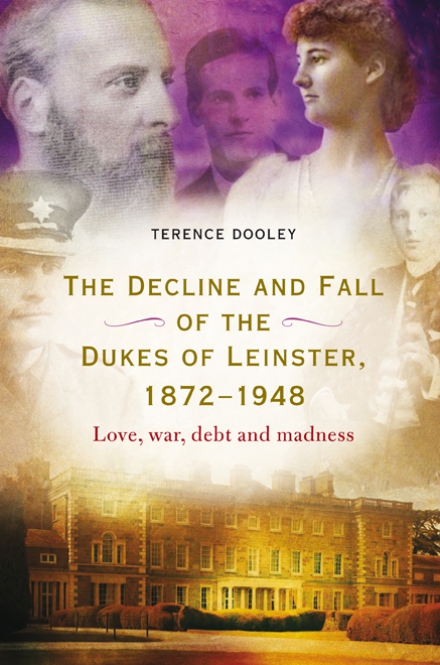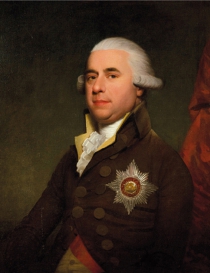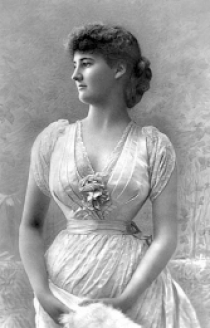The decline and fall of the dukes of Leinster, 1872–1948
Love, war, debt and madness
Terence Dooley
‘A fascinating saga, recounted with verve in this book', Diarmaid Ferriter, Irish Times (June 2014).
‘I cannot express how much I loved the story … chapter three is called “The marriage of Gerald and Lady Hermione Duncombe, 1884” and the facts that surround this marriage, and the subsequent decline of Carton house and its residents, are where I got sucked in and could not put the book down! … All through the book we are told of royal connections, details of wedding presents for the newly married couple, parties held in honour of coming of age birthdays, trips abroad to find suitable wives, lavish expenditure and the high life that eventually caught up with the FitzGeralds. We also get to see how much money was spent all through these years … Personal letters are dotted through the main story … It is astonishing how one family went through so much tragedy and heartbreak … if you enjoy historical fiction, stories of The Big House or the likes of Downton Abbey, this book will knock your socks off … this book is of very high quality and contains many beautiful photos spanning the whole story. A beautiful edition which is sure to become a collectors edition’, Margaret Madden, Bleach House Library (May 2014).
‘In his latest work Terence Dooley gets up close and personal with the lives, loves and troubles of Ireland’s premier aristocratic family, the FitzGeralds, dukes of Leinster, during the tumultuous period from the 1870s onwards … Dooley draws on a rich seam of primary source material in order to provide an intimate and revealing portrait of several key family members over several generations … this is a compelling narrative which combines empathy with close attention to detail … This book is elegantly written; it manages to achieve a balance between compelling biography and more serious historical analysis. While covering familiar ground in terms of the political challenge to landlordism represented by the Land League and Home Rule and the economic impact of land reform and the breakup of landed estates, the original contribution of this book lies in the close examination of the impact these developments had on one particular family and estate, combined with an insight into the more personal problems faced by various generations of this family over this period. Key family events such as comings-of-age are used effectively as points at which to pause and explore the broader political, social and economic landscape of the world that existed outside the demesne walls of Carton … it is a compelling tale, well-told’, Olwen Purdue, Irish Literary Supplement (Fall 2015).
‘In Ireland, fascination with big houses and their former owners amounts almost to an obsession. Nowhere is this clearer than with the perennial interest in the FitzGeralds, successively earls of Kildare and dukes of Leinster … Professor Dooley shows how though residence and shrewd paternalism they tended an enviable inheritance of fertile lands. But genetic chance, as well as political and economic developments, weakened and eventually ruined the dynasty … Dooley makes excellent use of the duchess’ letters to Lady de Vesci and of the Scottish hospital records relating to Duke Maurice ... he avoids the jaunty knowingness or sententiousness with which the Rutlands and Fitzwilliams (and indeed sometimes the FitzGeralds) have been treated', Toby Barnard, Irish Arts Review (Autumn 2014).
‘Terence Dooley has through research, official reports and persuasive lobbying, shifted the cultural landscape on how Ireland regards its aristocratic past … [this] is a rattling good yarn … This is an excellent book about much more than a single Irish aristocratic family’, Allen Warren, Family & Community History (April 2015).
‘Dooley entertainingly recounts many of the FitzGeralds’ foibles, fortunes, failings and the fact that they family had several true eccentrics, twisted and tormented in part by the dictates of their positions … Descriptions of their weddings, balls, clothing and gift-giving practices build a sort of Who’s Who of the place and times … Dooley’s rendering of this ancient family’s fall from power and grace is replete with mighty struggles, legendary heroes and horrendous personal fiascos, bearing witness to the ancient Latin warning: “sic transit gloria mundi”’, Mary McWay Seaman, Celtic Connection (November 2014).
‘A real gem for the genealogist, local historian or, maybe, the budding screenwriter … The story, many times reading like a great novel, moves from Maynooth to rural Co. Kildare to high society London and onwards to continental Europe and America before returning to Carton House. Dooley opens up a much romanticised world and, in doing so, he exposes its many contradictions and charts the reasons for the decline and fall of so many Irish and British aristocratic dynasties … An excellent and most enjoyable read’, Michael Merrigan, Ireland’s Genealogical Gazette (May 2014).
‘In perhaps a lesson for us all, [the book] finds that in a 70-year period, the Dukes of Leinster fell from being Ireland’s premier aristocratic family, close friends of the British monarchy, to relative obscurity in an independent Irish Free State … at the book launch in Carton House on 5 June, Conor Mallaghan said: “This book has everything. If it was fiction one might question the story line. A television series jumps from these pages'', Henry Bauress, Leinster Leader (June 2014).
‘Generally, though not specifically, the historiography of the landed gentry in nineteenth century Ireland has placed landed elites in the context of their relationship with the peasantry or as the antithesis of nationalist Ireland … the personal account of successive Dukes of Leinster relayed by Dooley allows this work to transcend these old narratives and provides the reader with an enlightening portrait of aristocratic life in the British Isles during the nineteenth and twentieth centuries … The standard of research and use of archival material is of the high standards associated with Dooley’s previous works on the landed estates of Ireland’, Robert Hartigan, Liverpool Postgraduate Journal of Irish Studies (February 2016).


